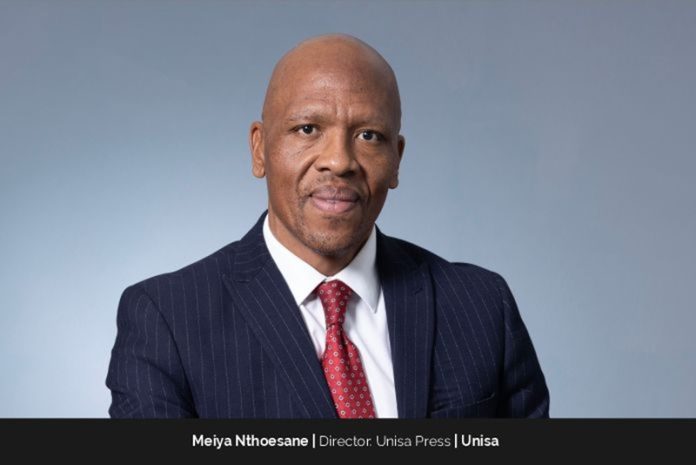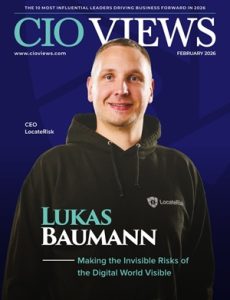Nelson Mandela once said, “It always seems impossible until it’s done.” The remarkable transformation of Unisa Press under Dr. Meiya G. Nthoesane, Director of Unisa Press, is a perfect example of this quote. He arrived at the Press, a business unit of the University of South Africa, at a difficult moment in its history. It was on the verge of collapse, and Dr. Nthoesane was entrusted with its revival and transformation. In a short time, he successfully steered the Press out of the choppy waters and into a promising, new era.
Dr. Nthoesane’s greatest accomplishment has been leading Unisa Press into digital transformation. By adopting advanced digital publishing platforms, he and his team have significantly increased access and readership of their publications, both locally and internationally. Dr. Nthoesane explains that this initiative led to an incredible increase in readership and helped African scholars engage with global audiences more efficiently. Furthermore, publication output increased, positioning Unisa Press among leaders in African academic publishing.
Joining Unisa Press at a Critical Juncture
“Education is the most powerful weapon which you can use to change the world.” — Nelson Mandela
Dr. Nthoesane’s academic leadership experience is underpinned by his unshakeable belief in education’s transformative power to shape societies and leave lasting impacts. According to him, this proved especially crucial when he joined Unisa Press at its critical juncture of strategic and operational challenges.
When he joined Unisa Press, Dr. Nthoesane immediately recognised that it needed a new direction to adapt to an ever-evolving academic publishing environment. He also noted the critical need to increase the representation of African voices within global academia.
“I found immense inspiration in being given a chance to stabilise operations and to realign them with their core mission – amplifying African scholarship,” Dr. Nthoesane says.
Publishing provides the platform to preserve and advance knowledge. Through his leadership of Unisa Press, Dr. Nthoesane has strived to ensure that African research is heard and celebrated internationally.
“My vision has been to transform Unisa Press into a dynamic force driving meaningful contributions towards global academic dialogue while supporting scholars across Africa,” he says.
Innovative Project: Launch of Open Access Publishing Program
The Open Access publishing program is one of the most innovative projects that Dr. Nthoesane has overseen at Unisa Press. Its launch marked not just an incredible milestone in their work but an unprecedented breakthrough in academic publishing across Africa. Dr. Nthoesane explains that the program eliminated financial barriers to accessing scholarly work, opening the doors of knowledge that had previously been out of reach of many, especially resource-constrained institutions. “It has had incredible repercussions; spikes in downloads of articles have resulted from our initiative, further expanding the visibility and reach of African scholarship,” he says. “Beyond numbers, this initiative is revolutionising how knowledge is disseminated and consumed.”
Now, Universities across Africa and global institutions are engaging more deeply with Unisa Press’s content, resulting in deeper collaborations and cross-pollination of ideas. According to Dr. Nthoesane, it is not just increasing access; rather, it has levelled the playing field for African scholars so they may join on equal footing in global academic debates.
Dealing with Challenges and Setbacks
Dr. Nthoesane’s tenure at Unisa Press has not been challenge-free. One of the most significant difficulties he has faced has been navigating the ever-evolving academic publishing environment, where technological innovations, increased competition, and budget constraints are rapidly changing the industry. He points out that as new publishing platforms and modes of content dissemination emerge, traditional academic presses like Unisa Press must innovate quickly or risk falling behind. To meet this challenge head-on, he prioritised cultivating an environment of continuous innovation within Unisa Press, encouraging his team to embrace cutting-edge tools like digital publishing tools and explore methods for reaching wider audiences – while staying true to academic rigour at all times.
Another significant challenge Dr. Nthoesane faces is competition in the publishing industry. According to him, their competition has become ever fiercer – from academic presses and commercial publishers stepping into their space with larger budgets and resources, placing greater strain on smaller institutions such as Unisa Press. To combat this threat, Dr. Nthoesane focuses on drawing upon their distinctive strengths, such as African scholarship, and providing platforms to underrepresented voices to establish their place within the highly competitive publishing market.
Financial constraints have also presented Dr. Nthoesane with challenges, particularly given limited funding for academic institutions. To combat this situation, he and his team have adopted more sustainable publishing models – Open Access, for example – while simultaneously exploring additional revenue streams and partnerships to ensure the long-term viability and financial sustainability of academic publishing activities.
“In addition, one of the most significant obstacles has been giving African scholarship the recognition it merits on an international stage,” Dr. Nthoesane points out. African researchers and their work were once often forgotten on that scene. To remedy this, he spearheaded initiatives to forge strong international partnerships and advocate for African scholars. He and his team worked closely with globally recognized institutions as well as lobbied for greater representation at international journals and conferences. This helped change the narrative. Now, Unisa Press stands as a pioneer for African scholarly expression on that stage.
Setbacks are not unusual in the publishing industry. Instead of looking at them negatively, Dr. Nthoesane embraces them as opportunities for growth. When faced with difficulties or challenges, he approaches each issue from a solutions-oriented mindset, looking for ways to adapt or innovate. “Resilience is crucial as well,” he says.
Dr. Nthoesane derives his motivation from Unisa Press’s impactful work for future scholars. It also helps him keep moving forward with his efforts. He adds, “Luckily, I find strength in my team – together, we navigate obstacles with a shared vision of success!”
A Director’s Responsibilities and Typical Day
As Director of Unisa Press, Dr. Nthoesane’s primary responsibilities involve overseeing all stages of publishing, from manuscript acquisition through final publication, and strategic planning – from strategic goals aligning to the university’s overall vision to expanding digital and open access platforms globally. At the same time, his focus is also on building strong relationships within local academic communities to elevate the Press’s reputation and influence.
Dr. Nthoesane’s typical workday is marked by strategic decision-making and deep engagement with academic publishing’s dynamic world. According to him, his day usually begins with high-level strategic meetings during which they assess ongoing projects, evaluate market trends, and adjust priorities to stay ahead of both internal and external demands. He points out that this requires operational excellence to ensure each project aligns with their long-term vision of expanding African scholarship’s reach and impact.
“My role encompasses many facets of hands-on leadership, such as reviewing manuscripts, working closely with authors to enhance their contributions, and ensuring our publications meet the highest scholarly standards,” he says. Furthermore, he interacts daily with his leadership team, which enables them to assess progress against targets and find ways to optimise operations more efficiently and effectively.
Collaboration is at the core of Dr. Nthoesane’s leadership style. For him, it plays a significant role, from forging partnerships with international academic institutions to working closely with departments within his university to strengthen Unisa Press as part of an academic ecosystem. “I put great value in forging strategic alliances that enable us to expand our influence, access new markets, and elevate African research globally,” he says.
“Beyond managing daily operations, I devote significant time and energy to thought leadership,” Dr. Nthoesane says. It is a fundamental aspect of his role to stay abreast of global academic publishing trends – through writing, public speaking, or participating in high-level dialogues with industry leaders – so as to shape its future direction. By remaining abreast of industry innovations and challenges, he ensures Unisa Press remains both competitive and forward-thinking within academic publishing.
Work-Life Balance
Dr. Nthoesane holds a high-responsibility role, which he balances with his personal life through discipline and clear priority-setting. As a leader and author, he recognises the significance of setting firm boundaries to ensure he sets aside time for reflection and innovation, both professionally and creatively.
“Writing requires mental clarity, so I try to take time out from daily demands to allow space for thoughtful introspection – which serves my leadership and writing needs equally well,” Dr. Nthoesane shares. “Families and personal well-being are integral parts of my success, so I make time for both.”
He also believes that a balance is vital to fuelling his creativity as a leader at Unisa Press. According to him, reflection time provides invaluable opportunities to stay sharp both professionally and artistically.
The structure is at the core of Dr. Nthoesane’s approach to effectively managing both professional and personal demands. He prioritises tasks according to their importance and urgency and delegates responsibility accordingly. Each member of his team is empowered with sufficient autonomy so they may contribute effectively. “My energy can then be focused on those areas most in need, be that leading an initiative at Unisa Press or being present for my family, Dr. Nthoesane says.
“Significantly, I recognise that sustained productivity requires not just time management but well-being as well,” he adds. Therefore, he always keeps physical and mental well-being top of mind. “I make physical fitness, mindful meditation, and intentional breaks a priority,” he says, “as they keep me energised while sharpening focus and creativity, so I bring my best self into every task that arises.”
As part of his daily practice, Dr. Nthoesane strives to remain fully present in any moment – be it an important business meeting or simply spending time with loved ones. According to him, by including mindfulness and wellness practices in his routines, he maintains the resilience needed for both leadership roles and personal fulfilment, creating long-term success.
Guided by Three Values
At Unisa Press, Dr. Nthoesane’s leadership is guided by three “uncompromising values”: excellence, inclusivity, and integrity.
At the workplace, he has fostered an environment in which excellence serves as their benchmark. “We do not settle for anything less than exceptional standards in every facet of our work,” he says. “By adhering to this commitment, we ensure we consistently produce impactful and world-class publications that focus on inclusivity as both a value and strategic imperative.”
Furthermore, Dr. Nthoesane and his team value diversity of ideas and perspectives as essential ingredients of innovation and progress. He believes that innovation often emerges through collaboration between diverse individuals in an academic environment.
And integrity drives decisions taken at Unisa Press. Every action, Dr. Nthoesane says, adheres to ethical and sustainable practices that cement its standing among trusted institutions. “These values do not simply serve as goals but instead form the backbone of our success and ensure we remain at the forefront of the publishing industry,” he adds.
Contributing to Future of Academic Publishing
Under Dr. Nthoesane’s exemplary leadership, Unisa Press is poised to lead scholarly and academic publishing forward in Africa by using cutting-edge technologies and innovative publishing models, such as open access. He explains that by adopting such approaches, they make African scholarship more readily accessible worldwide in addition to acknowledging and appreciating Africa’s intellectual contributions globally.
“Moving forward, we plan to increase our digital footprint further while spearheading initiatives that support emerging African voices within academia,” Dr. Nthoesane says.
Mentoring Next-Generation Leaders
For Dr. Nthoesane, mentorship is one of his highest priorities at Unisa Press. He has implemented various initiatives to foster new talent in the publishing field. These programs include an internship program, which gives young professionals hands-on experience in scholarly publishing, and leading a leadership development workshop designed to equip future leaders with skills necessary to navigate through publishing industry complexities. He has also created a mentorship network where senior leaders provide advice and assistance to up-and-coming scholars and professionals.
Advice to Aspiring Leaders in Publishing Industry
Dr. Nthoesane advises aspiring leaders to fearlessly embrace innovation and challenge the status quo. Publishing is constantly shifting, he points out, adding, those who succeed are those open to incorporating new technologies, ideas, and business models while remaining true to core publishing values of quality, integrity, and inclusivity. Dr. Nthoesane also encourages aspiring leaders to prioritise team collaboration. “It is paramount in producing lasting effects and achieving long-term impact,” he says.





